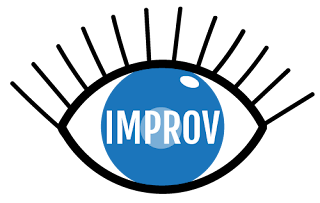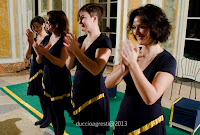SMART IMPROV - English version
Over the last decades, Improv theatre has accomplished a lot, way beyond Italy.
Thanks to international partnerships and collaborations, the world has seen a lovely tsunami of new shows and ideas, being monologues, dialogues, group shows, puppets, musicals, without words, comedies, dramas, based on real life, on pictures, maps, sounds and what-have-you; and everything has found its place on stage, thanks to dozens of local and global festivals, where we could discover and breathe all of this and more.
Yep.
On stage.
Because, well, when we're talking about new stage productions, we're probably in the golden era of improv theatre; but when we look for the same creativity in finding new "stages", it's not exactly gold we're talking about.
The neverending challenge between improv-on-stage and improv-on-screen is still facing some kind of standoff where very little is moving, and the only hearable voice is the one glorifying the powers of improv in front of a live audience, from a stage.
Off-stage improv has always been seen as some difficult niche to stay away from, instead of an unmissable opportunity; but after all, whoever approaches improv wouldn't probably do it without the promise of live performance, in very close contact and interaction with the audience, 'cause that's where the MAAAAAGIC is: live audience.
“The show couldn't exist without you."
Then Covid came.
And everything changed. Everything.
No time to talk it out.
In 48 hours, we retrieved Skype from the attic and discovered Zoom, Jitsi, Teams, Duo and the omnipresent Instagram and Facebook. Videoconferencing invaded our lives in all of their social vacuums, and improv world couldn't avoid being sucked in as well. Conference apps rose to fame from simple working tools to new restaurants, malls, pubs and of course theatres and schools (unwillingly, we had to ditch our beloved "let's meet for a coffee and talk about it in person") hosting for over two months any possible improv class or performance.
In Zoom's checkboard or through Jitsi's dots, that's where we've had to confine live shows, from the avoidable ones to some very good pieces of entertainment, but especially new and enjoyable ideas, that found on the web the dignity they probably wouldn't have found on stage, not to talk about the people that couldn't have seen them otherwise.
All of this happened at the same time all over the world (with maybe some delays of a couple of weeks. Thanks, Obama).
But of all that's going on in our world right now, what's going to stick?
While improv was losing time asking itself if it loved more mommy or daddy, what if a giant hole in the ground opened and dragged us into a whole new world, and what if we found out this new world isn't just dirt and fire, but we could find something new and comfortable here?
That's exactly the premise for this observatory over improv theatre's pandemic aftermath.
Off-stage improv has always been seen as some difficult niche to stay away from, instead of an unmissable opportunity; but after all, whoever approaches improv wouldn't probably do it without the promise of live performance, in very close contact and interaction with the audience, 'cause that's where the MAAAAAGIC is: live audience.
“The show couldn't exist without you."
"A big round of applause for you guys, we're in this together."
Then Covid came.
And everything changed. Everything.
No time to talk it out.
Worldwide lockdowns and a global pandemic can only mean one thing: we keep our jobs if adapting fast, from home, with the best possible tools and uploading any uploadable lesson, show, community.
In 48 hours, we retrieved Skype from the attic and discovered Zoom, Jitsi, Teams, Duo and the omnipresent Instagram and Facebook. Videoconferencing invaded our lives in all of their social vacuums, and improv world couldn't avoid being sucked in as well. Conference apps rose to fame from simple working tools to new restaurants, malls, pubs and of course theatres and schools (unwillingly, we had to ditch our beloved "let's meet for a coffee and talk about it in person") hosting for over two months any possible improv class or performance.
In Zoom's checkboard or through Jitsi's dots, that's where we've had to confine live shows, from the avoidable ones to some very good pieces of entertainment, but especially new and enjoyable ideas, that found on the web the dignity they probably wouldn't have found on stage, not to talk about the people that couldn't have seen them otherwise.
All of this happened at the same time all over the world (with maybe some delays of a couple of weeks. Thanks, Obama).
But of all that's going on in our world right now, what's going to stick?
While improv was losing time asking itself if it loved more mommy or daddy, what if a giant hole in the ground opened and dragged us into a whole new world, and what if we found out this new world isn't just dirt and fire, but we could find something new and comfortable here?
That's exactly the premise for this observatory over improv theatre's pandemic aftermath.
Of all of the solutions we came up with to manage the crisis, what's going to keep on going when the emergency will no longer loom on us? Which new languages, new resources and tools, maybe even parallel to the stage work? What has actually worked during these months? We have no interest in judging anybody, our only agenda is taking a picture of this gigantic messy situation to try and learn together from everybody's experiences. Because yeah, maybe this situation hasn't managed to turn us all into better human beings, but improv might surprise us all once again in being better than us: less walls, more technology, more internationality. Or perhaps, have lived for so much time on a stage and in the present moment, even improv will find itself unscathed and unchanged by all of this.
We're gathering all the information about the experiences of these months - March, April, May 2020 - following an inspirational non-logic, with no presumption of covering ALL of them, but always open to suggestions and thoughts from all over the world, to help us find out and analyze the largest possible area.
So, this is where our new adventure starts: 3, 2, 1...
We're gathering all the information about the experiences of these months - March, April, May 2020 - following an inspirational non-logic, with no presumption of covering ALL of them, but always open to suggestions and thoughts from all over the world, to help us find out and analyze the largest possible area.
So, this is where our new adventure starts: 3, 2, 1...
Stefano Augeri for improvvisatori.it







Commenti
Posta un commento